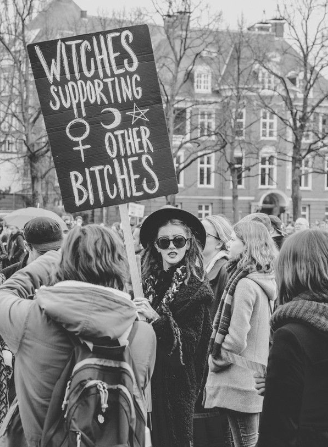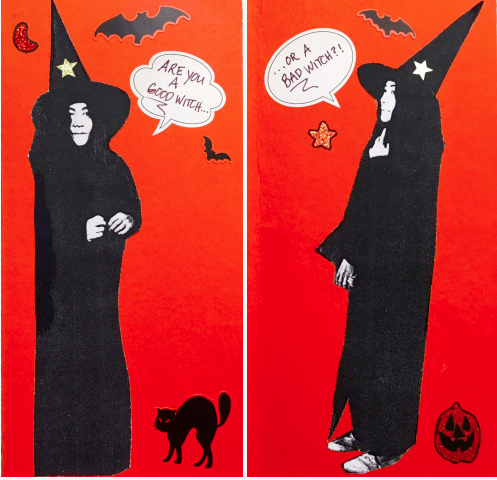Rock Witches: How Yoko, Courtney, and Sharon «Shattered» Geniuses

Ah, women in music history. If they haven’t been ignored, they’ve been demonized. When it comes to rock, there always seems to be a tendency to blame the woman for everything that goes wrong in the life of the poor, unfortunate male artist. Because, of course, these tortured geniuses couldn’t have self-destructed on their own, right? Obviously, because emotional responsibility is like a unicorn: a mythological creature that no one has ever seen.
Let’s start with the classic case of Yoko Ono because we can’t begin without mentioning the «witch» who «destroyed» The Beatles. According to urban legend, Yoko Ono is directly responsible for the breakup of the most famous band of all time. As if four grown men were puppets controlled by a single woman. Really?
The myth goes that Yoko, with her «malevolent» presence in the studio, planted the seed of discord among the Fab Four. But what people forget is that The Beatles were already sick of each other before Yoko came on the scene. They were like a family that couldn’t stand each other anymore, and Yoko was the perfect excuse to blame someone other than themselves.
Now, let’s be clear: blaming Yoko for The Beatles’ breakup is as ridiculous as blaming the waiter for the bad food at a restaurant. And if you think about it, Yoko Ono’s image has been demonized because she represents everything that a group of fans didn’t want: a strong, independent woman who dared to be creative and influence John Lennon’s life and art. How dare you, Yoko! How dare you be more than just a simple «wife of»! How bold.
And if you thought the tale of the «band wrecker» was left in the 1960s, you’re wrong. Jump ahead a few decades, and we find the next «culprit»: Courtney Love. Here we have another example of a powerful woman who has to bear the blame for a man’s decisions. Kurt Cobain, the leader of Nirvana, was a tormented soul long before Courtney entered his life, but of course, for many, it was Courtney who pushed him over the edge. Because, naturally, he had no will of his own.
Courtney Love has been accused of everything, from causing Cobain’s death to ruining Nirvana’s reputation. Look, being controversial is one thing, but having superpowers to dismantle the career of a legendary band? Come on. But why does the finger keep pointing at the woman when something goes wrong? Easy: because it’s more comfortable to maintain the status quo than to accept that women have just as much right to be flawed as men, and that the decisions their partners make are, in fact, the responsibility of those partners.
And since we’re on this topic, let’s take the discussion to the realm of metal, where things aren’t much different. How many times have we heard fans accuse a girlfriend, wife, or partner of «softening» a band’s sound? As if Metallica released Load because Hetfield’s and Ulrich’s wives told them to cut their hair and write «softer» songs. Sure, blaming the partner is easier than accepting that musicians can evolve or want to explore other paths. Do you think maybe they wanted to do something other than scream about Satan and death all the time? Shocker, right?
Another famous case in the metal scene is Sharon Osbourne, who is blamed (surprise!) for controlling Ozzy Osbourne’s career. Oh, the «evil» Sharon who managed her husband like a puppet! But, come on, Ozzy is hardly a child, and his decisions—good or bad—were his own, with the support of a woman who has been key to keeping his career alive. And yet, there are still those who insist on portraying her as a manipulative witch. I mean, if a woman can handle someone like Ozzy for so many years, maybe we should be thanking her instead of criticizing her.
Of course, we can’t leave out one of the most tragic and infamous examples: Nancy Spungen, the girlfriend of Sex Pistols’ bassist Sid Vicious. Nancy is often blamed for dragging Sid down a path of drug addiction and chaos, leading to his eventual death by overdose at the age of 21. Before Nancy, Sid was already struggling with addiction and self-destructive tendencies, but she quickly became the scapegoat for all of his problems. The press and public labeled her a «groupie» and a «bad influence,» refusing to recognize that Sid was deeply troubled long before he met her. Instead of exploring the complex issues of addiction and mental health, society chose to pin the blame on Nancy, reducing her to nothing more than the «witch» who led Sid Vicious to his demise.
What’s really at play here is the eternal fear of the powerful woman. Because if there’s one thing patriarchy can’t stand, it’s a woman who doesn’t stay in her «place.» And that’s exactly what Yoko, Courtney, and Sharon did. They dared to influence, to be visible, to not stay in the background, and that’s unforgivable to a society that prefers women to stay quiet and not meddle in «men’s business.»
The truth is, blaming these women for the failures or tragedies in their partners’ careers isn’t just misogynistic, it’s also simplistic and lazy. It’s an attempt to avoid the real conversation about mental health, the pressures of fame, and the mistakes of these men who, after all, are human. It’s easier to find a scapegoat than to confront the complexity of real life.
So, the next time you hear someone blame Yoko Ono, Courtney Love, or any other woman for «ruining» a musician’s career, laugh in their face and remind them that men have agency too, and that maybe—just maybe—it’s time to stop viewing women as the eternal villains of the story. Because it’s high time those old misogynistic legends were sent packing.












